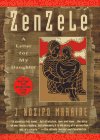Biography
J. Nozipo Maraire was born in Harare, Zimbabwe in 1966 during the transition of the country from colonial Rhodesia under Britain to the independent country of Zimbabwe. Maraire’s grandparents, parents, and other close family members were directly involved in the war for independence from both the British and the white elite. Maraire left Zimbabwe during the war. She lived and went to school in Canada, the United States, and Jamaica. These experiences influenced her view of the world: “I saw the world as vast and magical with so many different cultures and people,” she says. “It opened me up and made me very adaptable to change. It also meant that I was not afraid to be in strange places, to experience, and to learn” (Maraire). Maraire returned to Zimbabwe before the war ended, during the height of racism and fear. Despite their small numbers, the white inhabitants of Zimbabwe governed the country’s black majority. Living during this time period became extremely difficult for the blacks because they had to gain their freedom from Britain as well as from the white inhabitants of Zimbabwe. Maraire recalls, “I went to an all white school. It was horrid, the air seethed with anger and hate.” Maraire stayed in Zimbabwe until she was 18 when she moved to Boston to study at Harvard University. While growing up, she had dreamed about studying medicine in America. However, her plan was to return to Zimbabwe as a doctor who could help improve Africa’s healthcare and economy. Maraire’s dream came true when she went to Columbia Medical School after receiving an undergraduate degree from Harvard. After attending Columbia Medical School, Maraire completed neurosurgery training at the Yale School of Medicine. As a physician, she has worked with global health entities, including the World Health Organization. She divides her time between Zimbabwe and the United States.
Publications: Zenzele
Maraire has only written one novel, Zenzele: A Letter for My Daughter which was written without the intention of publication. Despite Maraire’s modest intentions, Zenzele was an extremely successful novel that was the New York Times Notable Book of the Year in 1996. Maraire used the novel as an opportunity to express her perspective on Africa’s promising culture as a young Zimbabwean woman. It gave her a chance to speak for her generation: “African women and especially young ones have been silent for so long. We are the discussed, the studied, the analyzed, and the written about. And so I am privileged to have been able to raise my voice and speak for what we felt and cried and yearned nationalities have given me such positive feedback. It inspires me.”
Rather than being an autobiography “in the true sense of it,” Zenzele is an “emotionally biographical” novel because it not only incorporates her life experience, but it is also a collection of childhood stories she heard from her grandmother, mother, and aunt about their fight for independence. “I have been through the depths of Zenzele’s soul. In a way I am each of the characters in the book as all authors are really,” Maraire has explained. The novel expresses her belief that it is every African’s “responsibility to give back to our countries what we have gained form the opportunities we have had.” Other major themes included in the novel are: history, racism, dreams, freedom, family, and love. The book Zenzele is a non-traditional first-person narrative written in the form of a single letter from a dying mother, Amai Zenzele, to her college-aged daughter. Each chapter is a single lesson intended to warn Zenzele of the hardships she may face as a black woman studying abroad at Harvard University. Each story is heart warming and refreshing, making the book extremely enjoyable to read. Additionally, the novel takes one through the mother’s painful realization that she could have made a larger impact on African society.
A final summative statement by Maraire reveals the importance of the book for the author: “I am privileged to have been able to raise my voice like a fist held high in a march, to raise my voice and speak for what we saw and felt and cried and yearned for.”
“In these letters written by a mother to her daughter we each become her child, enriched by her knowledge born of laughter as well as pain. Do read Zenzele.” – Rita Mae Brown
NB: The comments by Maraire come from an email interview with the author.
Selected Bibliography
- Bowker, R. “Zenzele: A Letter for My Daughter.” Publishers Weekly 242.43 (23 Oct., 1995): 57.
- Lee, Katrina J. “Zenzele by J. Nozipo Maraire.” The Daily Californian (1996).
- Lively, Penelope. “Tales out of Africa.” New York Times Book Review 3 Mar.1996: 7.
- Maraire, J. Nozipo. Interview on E-mail. 6 Dec, 1997.
- —. “Intracranial Cavernous Malformations: Lesion Behavior and Management Strategies.” Neurosurgery 37 (Oct.1995).
- Mayeri, Serena. “Literary Physician.” Harvard Alumni Association’s website. 1997. Web. No longer available online.
- McQuade, Molly. “Zenzele: A Letter for My Daughter.” Booklist 92 (Dec.1, 1995): 610.
- Olubunmi, Pamela J. “Zenzele: A Letter for My Daughter.” World Literature Today 71 (Winter 1997): 212.
- Volpi, Matt. “Zenzele: A Letter for My Daughter.” Debut Reviews. 1996. Web. No longer available online.
- Winders, Glenda. “Zenzele: A Letter for My Daughter.” Book Reviews. Web. No longer available online.
- “World Cultures and Geography: Zimbabwe.” The Center for Learning. Web. No longer available online.
Related Sites
Zimbabwe’s struggle for freedom
https://scholarblogs.emory.edu/postcolonialstudies/2014/06/21/zimbabwes-struggle-for-liberation/
Book review of Zenzele
http://www.metroactive.com/papers/metro/09.26.96/books-9639.html
Author: Melissa E. Wohl, Fall 1997
Last edited: May 2017
